Pneumonia is life threatening. This was the message to the Pattaya City Expats Club at their Sunday, November 20, meeting from Dr. Manoon Somranthin, M.D., Cardiologist with Bangkok Hospital Pattaya. He related a recent case of his where one of his elderly heart patients came to see him because he was sick. He wasn’t aware that his symptoms meant he had pneumonia. Unfortunately, he waited too long to come to BHP and he died several hours later as he sought medical attention too late to get effective treatment.
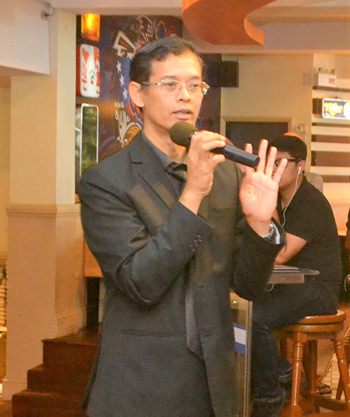
Dr. Manoon said since he has many elderly foreign patients, he thought it was important to bring not only the seriousness of pneumococcal pneumonia to his audience’s attention, but to also let everyone know there is a vaccine available that can prevent the most common causes of pneumonia.
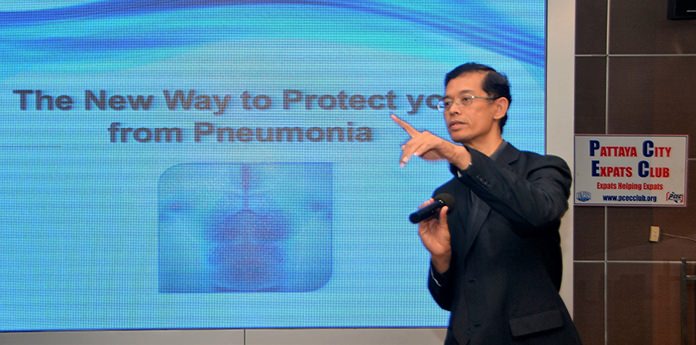
He mentioned that pneumonia has much more to do with age than with climate; although in cooler climates, pneumonia is more common during winter and early spring, it occurs year-round in the tropics. Further, highest mortality rates for pneumonia occur among elderly persons with underlying medical conditions. Patients aged 65 years and older are already at increased risk for pneumococcal pneumonia and the risk increases even further with the presence of chronic medical conditions.
He explained that people who are at the greatest risk of dying from pneumonia are those older adults who have long-term health problems such as heart or lung disease, sickle cell, diabetes, alcoholism, chronic kidney or liver disease, cirrhosis, leaks of cerebrospinal fluid, or a cochlear implant; and those with a weakened immune system including people suffering from Hodgkin’s disease, lymphoma, leukemia, kidney failure, multiple myeloma, nephrotic syndrome, HIV or AIDS, a damaged or no spleen, or having had an organ transplant. Also at great risk are smokers, asthma sufferers and others with weakened respiratory systems. But the good news is those at high risk can be vaccinated with Prevenar 13 (PVC13), which can prevent the most common causes of pneumonia.
Dr. Manoon said pneumonia can be caused by many different bacteria, viruses, and even fungi. Pneumococcus is found in many people’s noses and throats as a type of bacteria, and can be spread by coughing, sneezing or via contact with respiratory secretions. He said you can even get pneumonia from a swimming pool, or a dirty table. Also, there are many cases of patients contracting it in a hospital environment (in response to a question from the audience, he said if you are worried about getting it when you visit the hospital, you should request a mask to wear during your visit).
Dr. Manoon noted that pneumonia has a 1 to 3 day incubation period, and that the symptoms are similar to those of the flu. Symptoms can include an abrupt onset of fever, chest pain, cough, rapid breathing and heart rate, shaking chills or rigors, muscle aches, shortness of breath and weakness.
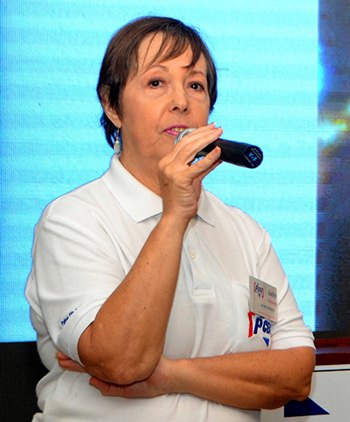
He said Pneumonia can also lead to meningitis (infection of the covering around the brain and spinal cord). Meningitis accounts for 13 – 19 percent of all Pneumococcal diseases in the U.S and has as high as 80 percent mortality in elderly patients. Symptoms of meningitis can include fever, nausea, sleepiness, confusion, seizures, headache, sensitivity to light and sound, vomiting, stiff neck, and coma.
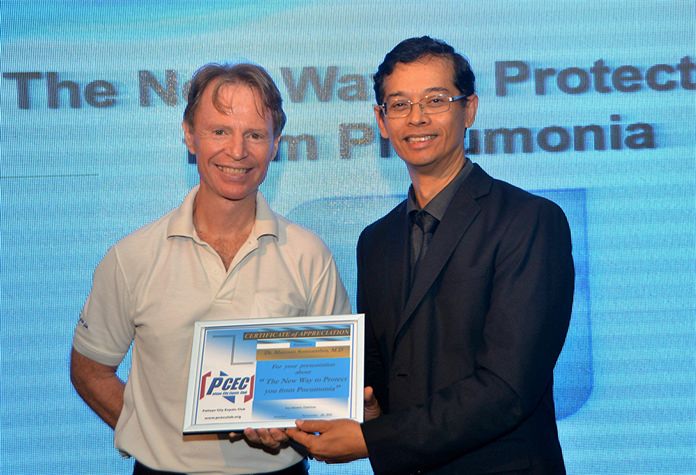
While pneumococcal pneumonia is much more prevalent and leads to more deaths than pneumococcal meningitis, the death rate is proportionately higher for those that contract meningitis, it also can result in a disproportionate amount of long-term illness as well as death. Globally, pneumococcal meningitis is responsible for approximately 120,000 deaths and over 8 million disability-adjusted life years (DALYs) are lost each year. Pneumococcal pneumonia is responsible for over 827,000 deaths and almost 27 million DALYs each year.
The bottom line, according to Dr. Manoon, is that if you are over 65 you should get vaccinated against pneumonia (a flu shot will not protect you from pneumonia). Dr. Manoon said about ten percent of people may suffer some side effects from the shot, such as fatigue, new muscle pain, headache, aggravated muscle pain, or aggravated joint pain, but the side effects only last up to about 48 hours. He said you should get the shot every 4 or 5 years. The vaccine is available at Bangkok Hospital Pattaya which is 4,700 baht, but the hospital is offering a special price of 3,300 through December 31. Further, you do not have to consult with a doctor in order to receive it.
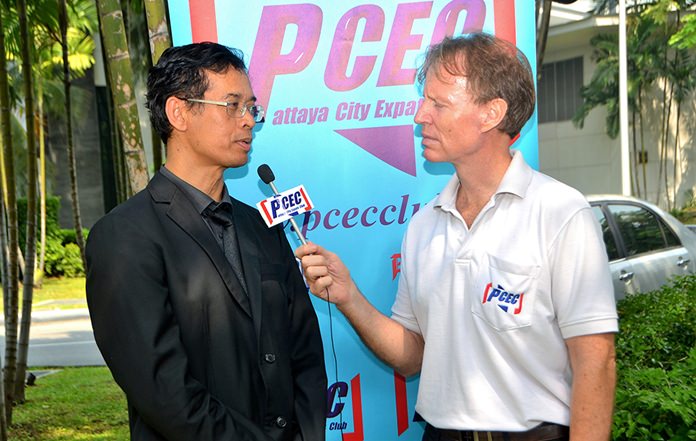
After the presentation, there was a lively Question and Answer session as many in the audience asked questions or offered some of their own experiences. To illustrate the contagious nature of Pneumococcus bacteria, a man in the audience mentioned to the doctor that he had contracted pneumonia by kissing a young Thai bar girl who he thought only had a cold.
After Dr. Manoon’s presentation, Club Treasurer Judith Edmonds shared with her fellow PCEC members and guests the experience of attending the previous night’s 76 Million Hearts Mourn Our Father event on Pattaya Beach Road. Since both the Club Chairman and Vice-Chairman were unavailable because of travel outside of Thailand, Judith stepped in as the Club’s official representative. She said there were thousands of people, both Thai and non-Thai, in attendance and it was obvious there was real grief at the recent passing of His Majesty King Bhumibol Adulyadej. She described the music, speeches, and the lighting of thousands of candles that took place and said it was one of the most moving experiences she had ever had.
After Judith’s description of the 76 Million Hearts Mourn Our Father event, MC Ren Lexander brought everyone up to date on upcoming events and was followed with the Open Forum where questions are asked and answered about Expat living in Thailand, especially Pattaya.
For more information on the PCEC’s many activities, visit their website at www.pcecclub.org.




